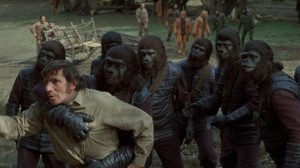 So after the racie war implications driving the plot of Conquest of the Planet of the Apes, 20th Century Fox, fearful that they had driven the kiddie away, took the next, and final, installment of franchise in a lighter and more optimistic direction. The screenwriter for the previous two sequel relinquished his duties, in part due to the dark nature of his proposed script and in part to ill health, while the husband wife team that penned the screenplay for The Omega Man came onto the scene.
So after the racie war implications driving the plot of Conquest of the Planet of the Apes, 20th Century Fox, fearful that they had driven the kiddie away, took the next, and final, installment of franchise in a lighter and more optimistic direction. The screenwriter for the previous two sequel relinquished his duties, in part due to the dark nature of his proposed script and in part to ill health, while the husband wife team that penned the screenplay for The Omega Man came onto the scene.
In many ways this film is the most direct sequel of the entire franchise. Where Beneath the Planet of the Apes introduced a new astronaut the Ape Planet, nothing in the first film set up the silly concept of a rescue mission. Escape from the Planet of the Apes heavily violates continuity by introducing an unknown Ape genius “Milo” who is able to repair and launch Taylor’s crashed spacecraft. Conquest played buffet with elements put forth in Escape, picking and choosing what they wanted to tell a story with some of the same characters, and throwing away anything that didn’t fit. (retconning long before the term became standard in fandom.) That is not the approach with Battle for the Planet of the Apes.
Battle takes the situation and characters established Conquest and continues the story, playing mostly fair and extrapolating from the scenario already in motion. Despite this, or perhaps even because of it, Battle for the planet of the Apes is the least ambitious, least transgressive, and least daring of the franchise. The budget was again cut, and the situation reduced to the most simplistic elements. A colony of apes, lead my Caesar from Conquest, is building an ape community with humans as second-class citizens, but not slaves or property, amid the ruins of a nuclear war. Racial animosity against the human divides the apes, while a colony of surviving humans, scarred by the constant exposure to radiation in the bombed out city, led by a brutal security man from Conquest, plots a war of ape extermination.
The too small budget hampered the production, reducing the screenplay to one rather lackluster battle and a few set locales. The film ends on a note of optimism, putting it in direction conflict with the tone of the series while implying that the events of the first film were no longer possible.
While the franchise limped on with a short lived and poorly conceived television series, this film represented the end of the series until the terrible attempt at a reboot with Tim Burton’s Planet of the Apes. That failed and the franchise again went dead until the next film Rise of The Planet of the Apes, a success which in many ways was a rebooting of Conquest in that it told the story of how the planet got started on the path toward humanity’s fall and the rise of the apes.
This year saw the next film in the new franchise, Dawn of the Planet of The Apes, and in reality it is a rebooting of Battle, but done with real style, a real budget, and far better written. I will be interesting to see where this new franchise series goes.
